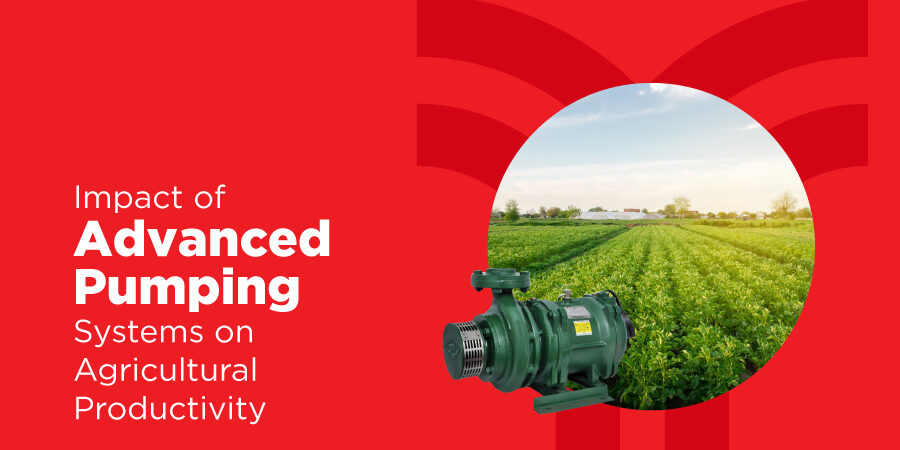The impact of advanced pumping systems on agricultural productivity
Water pumps are now playing an important role in agriculture to move water from its supply to where it is needed. In farming, there are advanced pumping systems; one such is the electric water pumps which are important for irrigation. And the advanced features in pumping systems have a great influence on agricultural productivity with various advantages. Read this article to understand the advanced pumping systems which increase productivity.
Modern technologies, like electric water pumps, are revolutionizing the lives of smallholder farmers by offering affordable and sustainable solutions for high-expense farming. When compared to traditional fossil-gas-based pumps, these 2 hp agriculture water pumps have helped farmers save up to 70% on irrigation costs.
Electric pumps: How are they useful?
Agriculture is experiencing a revolution because of the increasing usage of electrical water pumps, which offer an efficient and affordable way to ensure consistent water distribution for plants. These pumps are especially valuable in remote locations with limited access to clean water, which makes them essential to the success of modern farming methods.
Farmers utilize a variety of water pumps, including centrifugal, submersible, piston, shallow proper jet, and advanced effective jet pumps. Water pumps are essential to agriculture as the purpose of these pumps is irrigation and farmers can simply provide the right amount of water to their plants at any location on their field by using water pumps, ensuring that plants get the right amount of water at a suitable temperature and pressure.
Importance of water pumps in agricultural irrigation:
The efficiency of irrigation systems for agriculture is largely dependent on water pumps. They make it easier for water to be transported effectively from its source—such as wells, rivers, or reservoirs—to the agricultural fields. Here are some salient features of their significance:
- Accessibility to water sources means the land for farming is not always close to natural water resources. This gap is filled with water pumps which makes it easy for farmers to access the water from the distant rivers or wells that allow them to irrigate dry areas.
- The quantity and time of water application need to be precisely controlled in modern irrigation. If you have modern technology that allows farmers to customize the irrigation schedules suitable for the different crops based on the requirements. This ensures the ideal development circumstance which is quite useful for farmers.
- It is easy to optimize water efficiency with the investment made on the right water pumps which provide better reliability and effectiveness. This provides a substantial contribution to agricultural water conservation. These pumps are made to reduce water waste and improve irrigation systems’ overall effectiveness.
Energy-efficient pumps: How are they useful in the manufacturing field?
There are advantages of using energy-efficient pumps in manufacturing which are,
- Lower energy costs which result in cost savings which enhance the business profitability.
- You can expect smoother operations and increased productivity with two factors which are efficient pumps that help to achieve eventual advantages in manufacturing production.
- Less frequent and expensive maintenance is required because efficient operations reduce wear and tear and thus, gain less maintenance costs.
- The use of energy-efficient pumps exhibits greater reliability which ensures the performance of the water pumps with uninterrupted functions.
- In industrial environments, you can consider the consistent and dependable performance of high-efficiency pumps.
- Since it delivers increased efficiency that gradually lowers the chances of system malfunctions and reduces lost productivity and delay.
- Energy-efficient pumps show dedication, and sustainability which helps the project an image of environmental responsibility.
Solar water pumps impact agricultural productivity:
The ability of solar-powered irrigation systems to improve the utilization of water is one of its most significant benefits. These systems can extend the growing season and improve farmers’ economic prospects by offering a consistent supply of water, reducing water waste, and using less energy. Systems for solar water pumps have several advantages.
- Utilizing solar energy to run the pumps, they are less dependent on traditional electrical sources.
- For delivering water straight to plant roots, they can be combined with drip irrigation systems to improve water efficiency even more.
- Water waste is decreased with this accurate and trustworthy watering system.
- They use clean, renewable energy to promote a sustainable environment.
- Also, by reducing the cost of labour and water consumption overall, improving farming operational efficiency, and allowing effective water pumping for irrigation, the combination of solar pumps and smart farming practices maximizes water usage.
Conclusion: It is difficult to minimize the significance of these modern water pump technologies because they are essential to the advancement of sustainable farming and agriculture practices, ensure the uninterrupted delivery of water for agriculture, and ultimately increase farmers’ profits. Industries can significantly advance toward a more sustainable and environmentally friendly future by comprehending the elements affecting solar open well submersible pump energy efficiency and putting the recommendations into practice.


